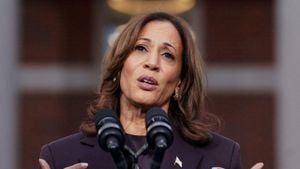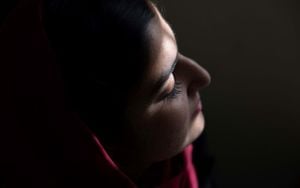Hillary Clinton's recent visit to Belfast sparked both accolades and protests, drawing attention from supporters and dissenters alike. The former U.S. presidential candidate addressed students at Queen’s University, where she is the chancellor, discussing women's leadership and the barriers they face to ascendancy, particularly the societal perceptions surrounding the look of leadership.
While inside the university, Clinton orchestrated inspiring conversations about women stepping up and the hurdles they have to navigate to gain recognition and power. She highlighted how tradition shapes the way society views potential female leaders, emphasizing the need for women to look beyond notions of perfection, which often holds them back from pursuing leadership roles. "You will never be perfect, no matter how hard you try. You can, but you can also get certain things right, and you can keep improving," she urged.
But outside the university, the atmosphere was charged with tension. A counter-demonstration unfolded, with protesters voicing their displeasure with Clinton’s visit. The Police Service of Northern Ireland reported injuries among four officers during the tumult, with some individuals charged for resisting arrest and other public disorder offenses. One protest leader, carrying Palestinian flags, shouted slogans against the former Secretary of State, underlining the deep-seated issues of foreign policy and justice activism.
Details of the protest are pivotal. Onlookers at Queen’s witnessed demonstrators carrying cutouts of Clinton with stark visual messages, as they demanded attention to what they perceive as injustices occurring abroad. This immediate reaction revealed not merely discontent with Clinton herself but spotlighted broader issues of U.S. foreign policy related to Israel and Palestine. With tensions tangling the legitimacy of the former senator's presence, it became clear her visit was not just about leadership but intertwined with global discourse on human rights.
According to Queen’s University, they acknowledged the protesters' rights to free speech and assembly, but expressed disappointment at the behaviour of those who clashed violently. A university spokesperson emphasized the commitment to provide safe learning environments, reflective of the sentiments of many institutions balancing free expression with public safety concerns. "Although we respect the right to protest, we urge peaceful demonstrations and discussions," they noted.
Following the chaos of Thursday evening, disturbances continued as protesters returned to the streets for additional demonstrations. Trying to control the situation, police managed traffic, advising the public to avoid areas surrounding the City Hall and Queen’s University, anticipating rerouted traffic due to the rallies. Local reports indicated heavy police presence as demonstrators shouted chants of discontent which echoed through the streets of Belfast. Superintendent Finola Dornan of the PSNI made it clear: "What was experienced yesterday cannot be described as peaceful," underscoring the challenges law enforcement faced amid the unrest.
Clinton, meanwhile, continued to speak on the podium about the empowerment of women and the need to challenge stereotypes. She recounted historical examples of female leaders within parliamentary systems, contrasting them with presidential systems, citing how women leaders often rise through party ranks, gaining exposure and credibility before taking the limelight at national levels. "The head of government and head of state roles are combined, demanding the look and the performance which presents unique challenges for women,” she stated.
But her assertion about the hurdles women face did resonate with many supporters at the event. Several attendees thanked Clinton for her unwavering commitment and effort to advocate for equity for women, especially those stepping forward to seek leadership roles. Women such as Fleur Anderson, Northern Ireland's minister, echoed the sentiment, highlighting the struggles and triumphs of women within the political sphere.
While Clinton addressed important aspects of female representation, the immediate public discourse moved to the ramifications of her visit. Those who took issue openly voiced concerns about the U.S. government's handling of international conflicts and its impact on local sentiments, especially concerning Palestine. Activists argued against the backdrop of legislative and military support received by Israel from the U.S., connecting these discussions back to the presence of public figures such as Clinton.
Effective leadership, Clinton stressed, goes beyond traditional expectations. She criticized the inherently performative nature of today's political scene and warned about the corrosion it can lead to, both for politicians and the people they aim to inspire. Women, particularly, were urged to recognize their intrinsic value, and not gauge their worth through the restrictive lens of perfectionism or public scrutiny.
"You don't need to be perfect to step up. Don't let the fear of imperfection paralyze you; instead, embrace your flaws and grow," she said passionately, framing the conversation around confronting stereotypes faced by women from varying backgrounds.
Despite the chilling events outside, the essence of Clinton's rhetoric managed to inspire many who see her as both a mentor and beacon for change. Indeed, those engaged within the Queen's community watched not only the storm around them but the broader tides shifting within discussions surrounding leadership.
The culmination of Clinton's visit, marked by vigor from supporters and discontent from protesters, proved to be more than just another speaking engagement. It tapped deeply at the current societal pulse, calling attention to active debates over women's leadership and the murky waters of international politics.
With everything at stake, from individual ambitions to collective protests, the continuous dialogues sparked by one notable figure's presence laid bare both the progress and challenges still facing women today. And those challenges, be they action against systemic barriers or addressing global disparities, highlighted how the road to equality is still being paved brick by brick.
"Given the layers of issues facing us today, the bigger question isn't only about female leadership but the contexts from which they emerge," commented Joan Rourke, an observer of local politics. Insights gathered from various testimonies around Belfast suggest this confrontation continues to resonate, answering calls not just for equal representation but for genuine dialogue and actionable unity among diverse groups.
This visit, and the events surrounding it, illuminate much about local and global interconnectivity as they rippled through Belfast’s streets—engaging students, offending some, and inspiring others to push for change from the ground up.
The varied reactions encapsulated within this saga remind us so much relies on dialogue, perseverance, and perhaps most critically, the breaking away from the notion of perfectionism, recognizing the momentum built can drive substantial changes.



